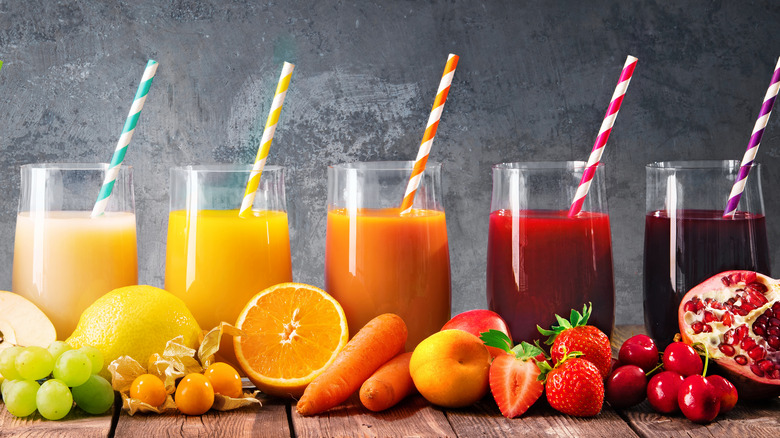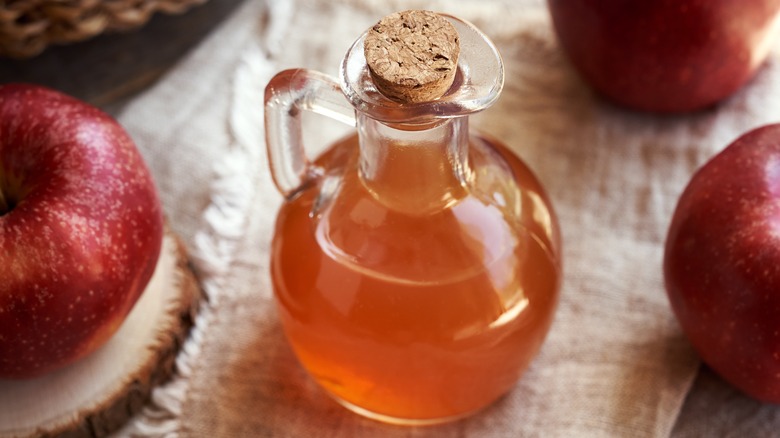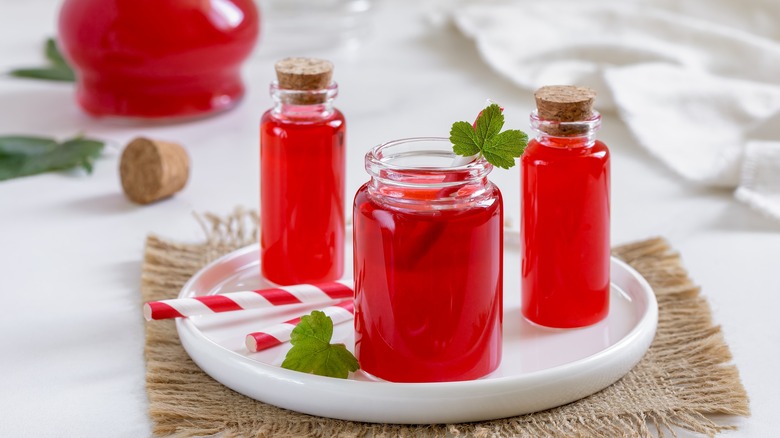The Only Ingredient You Need To Fix Overly Sweet Fruit Juice
There's something so refreshing about a glass of fresh fruit juice. Whether you start the day by sipping on fresh-squeezed orange juice or splurge on a fancy cold-pressed green juice from time to time, the beverage hits the spot. At least, as long as it's not too sweet. While fresh juice is a tasty and nutrient-rich drink for staying hydrated, some store-bought bottles are packed with added sugars, so they aren't always as healthy as they seem. Even a single cup of 100% fruit juice can contain upward of 20 grams of sugar thanks to the fructose. Natural or not, sometimes the saccharine flavor can overwhelm the taste buds, especially if it's accompanied by an almost syrupy thickness. Fortunately, there's an easy fix for overly sweet fruit juice.
Your first thought might be to add water, which is the most common approach to the problem. While this method dilutes the drink so it's not as sweet (and may even make the bottle last longer), it does so at the expense of flavor. Depending on how much water you mix in, the fruitiness can end up fairly masked. So, instead of watering down your juice, there's something else you can add to tone down sweetness without compromising flavor: apple cider vinegar.
Add a little apple cider vinegar for acidity
A common addition to salad dressings and marinades, apple cider vinegar is a versatile ingredient in cooking. It can even be used for cleaning certain appliances in the kitchen, making it a saving grace for more than just juice. Ironically, though, that's exactly where it comes from, so it's only natural that it can be added to it. Made by fermenting apple juice, the acidic liquid can nicely complement other fruit-based foods and beverages without being noticeable. In fact, apple cider vinegar is a reliable substitute for apple juice in some recipes.
Whether used for cooking or for fixing overly sweet fruit juice, a little goes a long way. When putting it in juice, Lifehacker recommends starting with the smallest of splashes, even ⅛ teaspoon might do. Stir the drink thoroughly after adding the apple cider vinegar, then taste it to check the sweetness level. Make adjustments as needed until it's to your liking. The new presence of acidity in the fruit juice lends it a subtle sourness that helps balance out the excessive sweetness. While apple cider vinegar does have a strong, slightly funky scent and taste, its own fruitiness shouldn't impact the flavor of the juice, especially if it already contains apples. While it might sound a little strange to add vinegar to a drink, it's actually a staple ingredient in a shrub — and no, we're not talking about the plant.
How vinegar is used in other drinks
For mixologists, shrub standardly refers to a vinegar-based fruity syrup used to flavor cocktails and nonalcoholic beverages. Sometimes, shrub is used interchangeably for the name of a drink that it's used in, which is often made by combining the syrup with spirits, soda, or sparkling water. The word doesn't get its name from the bush that grants many gardens privacy, but from the Arabic word "sharāb," meaning "drink." Although its etymology suggests its origins can be traced back to the Middle East, since its first creation, shrub has also been a part of beverage-making practices everywhere from ancient China and India to colonial America.
While shrubs have historical roots in preserving food (particularly fruit), as vinegar can slow microbial growth and predates modern refrigeration, their use in cocktails and mocktails across the U.S. today is related to flavor, not food storage. The syrup typically features fruit that's sweetened by sugar and soured by vinegar, offering a unique tanginess — and often a fun color — to drinks. For instance, an apple-based shrub uses apple cider vinegar in particular and might be added to a bourbon-based cocktail fit for fall. So, in a sense, adding the fruit-based vinegar to fruit juice to balance out excessive sweetness is similar to a modern mixology trend with a much older culinary past.


